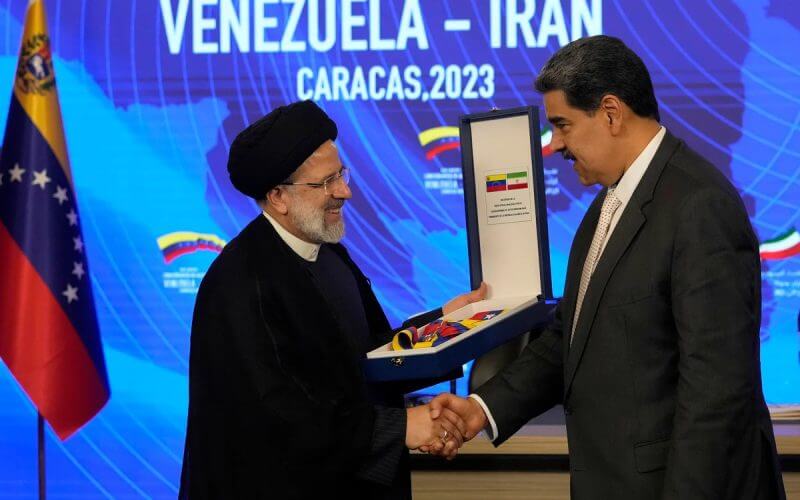The Islamic Republic of Iran's President Ebrahim Raisi announced on Monday during a visit to Venezuela that Iran plans to increase bilateral trade relations from $3 to $20 billion alongside the socialist Venezuelan government under President Nicolas Maduro.
During Raisi's visit, the two anti-American nations signed a memorandum of friendship to expand work in petrochemicals, collaborate on joint projects, and strengthen their close cooperation in the oil sector.
After the two leaders signed a petrochemical deal and several other cooperation deals, Raisi said that his government and Maduro's have "decided to increase the cooperation between the two countries."
"The goal we have for commercial and economic cooperation, the first step is to take the level of cooperation to $10 billion," the Islamic Republic president added. "The next step we want to take is to $20 billion."
Venezuelan state television said the accord between Caracas's petrochemical firm Pequiven and its Tehran counterpart would produce cooperation in oil exploration and development and evaluate the possibility of new joint projects. The two regimes also agreed to expand collaboration in mining for precious minerals.
"This trip by Iranian President Raisi has only one purpose - to expand and intensify the destabilization of Latin America and the Caribbean through partnerships with the most anti-American, authoritarian regimes in the region," said Joseph Humire, executive director of the Center for a Secure Free Society, and a visiting fellow at the Heritage Foundation.
For his part, Maduro praised Raisi's visit and the two countries' bilateral relationship, adding that future deals and investments were on the horizon. The trip to Venezuela was the first stop on the Raisi’s Latin American tour. Cuba and Nicaragua are next on the agenda.
Last year Tehran and Caracas signed a 20-year cooperation plan, vowing oil partnership, defense, and other issues related to the safety and security of each other's regimes. The 20-year cooperation agreement included the maintenance of Venezuelan oil refineries. These refineries are known to be the world's largest crude reserves but have recently struggled to create enough gasoline and diesel, resulting in shortages and long queues.
Tehran agreed to provide fuel and diluents to help Venezuela's heavy crude convert into exportable varieties. Since 2020, Tehran has provided parts for repairs to refine circuits of Venezuelan refineries.
"Almost all of the commercial cooperation Iran has with Venezuela, Cuba, Nicaragua (and Bolivia) has a dual use for intelligence and military purposes," Humire told The Foreign Desk.
In May of last year, a unit of Iran's state-owned refiner NIORDC signed a 110-million-euro contract to repair Venezuela's smallest refinery, El Palito, which has a capacity of 146,000 barrels per day.
Since the 1980s, Iran has increased its presence in Latin America, supporting socialist dictators like Maduro in Venezuela, Nicaragua, Cuba, Colombia, and Brazil. Tehran has aided its Lebanese Shiite terrorist group, Hezbollah, in Lebanon, which has grown in Argentina, Brazil, and Colombia, engaging in arms and drug smuggling, human trafficking, and more.
Humire notes that Iran's Mohammad-Reza Gharaei Ashtiani is "traveling with Raisi to Caracas, Managua, and Havana."
"That is a tell of what this trip is truly about. Exporting weapons, terror, and hybrid warfare," he added.
As the US and its allies continue to place sanctions against Iran, the regime in Tehran has relied on Latin America to assist in evading sanctions from the West and using the region to grow its presence in America's backyard.
In late February, two Iranian warships docked in Rio de Janeiro after Brazilian President Luiz Inacio Lula da Silva's government granted permission despite pressure from the Biden administration to prevent them from docking.
Related Story: Iran’s Regime Moves Closer to American Shores with Venezuela’s Help










